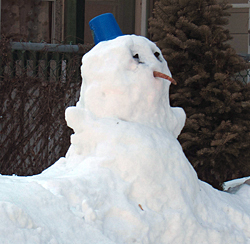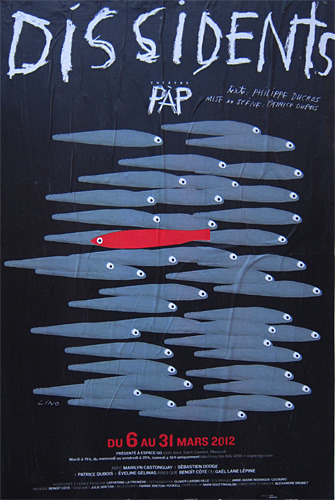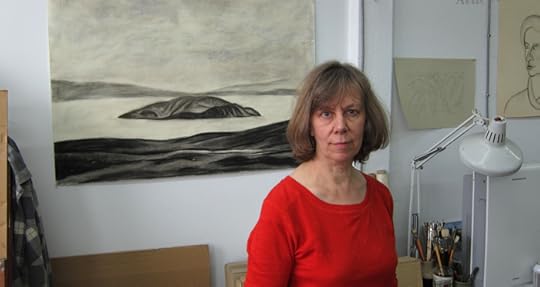Elizabeth Adams's Blog, page 102
March 12, 2012
A New Drawing in Progress
Moss, Lichen, Rocks at Þingvellir. I started this on Friday, and am hoping to finish it in the next few days.
March 9, 2012
On Posterity
from "The New World of William Carlos Williams," NYRB 2/23/2012:
"...Spring and All, the 1923 collection that included three of his masterpieces...was published by a small press in an edition of 324 copies, 'most of which went unsold.' A collection of stories called The Knife of the Times appeared in 1932; a doctor friend of Williams's later found a hundred of them being sold by a hawker on the Atlantic City boardwalk for 15 cents apiece."
March 8, 2012
Marching into March
The days grow longer and brighter, although after a stretch of springlike weather the temperatures have plunged again, covering the sidewalks with sheets of ice where, during the thaw, melting snow had formed lakes of water dammed by the snowbanks on either side. With March the strong winds have begun, too, and the trees creak and groan as they sway, sometimes violently, above skating rinks destroyed and yellowed by the cycles of freezing and thawing.

Last week there was a spring storm: thick heavy snow perfect for packing. A population of quirky snowmen sprang up overnight in the yards and parks, from the more predictable bonhommes de neige with carrot noses and French toques to a jazzman with a broken but real brass trumpet cradled on his white shoulder.
On Saturday the sun came out just as I left the apartment, which was fortunate, because the air was cold, and I walked the many blocks stopping occasionally to stoop down and scoop up a handful of perfect snow and pack it into an orb as dense as a baseball that I'd toss from hand to hand for half a block, and then lob at a street sign or tree, remembering how much it hurt, as a child, to receive such a snowball on the back of one's neck, but how impossible it was to resist making and throwing them.
The cold dry air exhilarates the senses but the will seems almost paralyzed. Maybe it's simply unnatural to live here; maybe we need a period of hibernation, like the creatures drowsing in their dens and nests, preparing to give birth in the spring. Instead there's a pile of distractions which reinforce the sense of urgency overlaid with torpor: accounting; tax returns; preparing for the bathroom renovations which will begin next week; friends and family to contact and see; publications to design; articles to edit; a Lenten workshop to teach...along with all the quotidian tasks of meals and shopping and laundry and cleaning up.
My creativity doesn't feel so much arrested as lugubrious, and I gaze at my projects like blurry, distant apparitions in one of those dreams where my legs are heavy and achy and won't carry me where I need to go. In real life, though, it's my mind that feels dull and tired.
On Saturday, alone here with plenty of time, I forced myself to concentrate, and worked through a number of ideas for new drawings. The next day, between singing for the morning Eucharist and Evensong, I went to the art supply store and bought four more large sheets of paper, but they still lie snowy and untouched on my drawing table, a crevasse gaping between us. When I approach the edge and peer in, my distractions and desires stare up at me, chattering like a colony of hungry penguins.
The worst depression of my life happened at this time of year, a few decades ago, so I'm always wary. It's different now though; even with my sense of so much unfinished, so much left to do, and the clock ticking faster, I've learned not to beat myself up. Little by little we move forward toward spring, enduring its fitful reversals, and one day the sap begins to run in the maples. Today, in the neighborhood store, I saw the first tins of this year's syrup, the first pots of maple cream, and a display box of cornets d'erable: tiny ice cream cones hand-packed with soft maple candy, a treat I'd never seen before moving here. I didn't buy any, but maybe tomorrow...
(update: I wrote this a couple of days ago, and now we're in the middle of another big thaw - it's sunny and almost 50 degrees here today; people are out washing their cars on the streets and looking cheerful, and I feel really energized!)
#haiku 3.8
Yellow dogwood stems
above the snow; the cowardice
of this fitful spring
March 7, 2012
Iceland from the Air
Sandro Santioli spent 70 hours in flight over Iceland, taking some astounding photographs of this otherworldly landscape. I'm fascinated, of course, since I'm immersed in Iceland-on-the-ground these days. (Hat tip to Marly Youmans for the link!)
March 1, 2012
Double Take: In the Studio
With "Island, Thingvallavatn", in my studio, March 1, 2012.
And here's a second version, identical except for the color, below.
I find it interesting to study what's emphasized in each one, how they feel different.
What do you think?
February 28, 2012
Swimming Upstream
 Great poster, isn't it? I love their eyes.
Great poster, isn't it? I love their eyes.
I've been thinking a lot about the human schooling behavior better known as social networking. or, to be completely accurate, about my own participation in it. I go onto Facebook several times a day, for little reason, really, except that I get bored doing other stuff and it feels more interesting to see what my friends are saying or doing. But I often leave feeling disagreeable. Annoyed at myself for wasting time. Annoyed at the corporate culture that manipulates us and uses our flocking behavior, our desire for social interaction, for its own ends. Depressed by superficiality, phony "friendship,"and by our collective loneliness. And at other times I'm caught up in something positive, glad to hear news from a far-flung friend, happy to follow a good link, amused by a witty conversation or challenged by a debate.
I've had an active online life for almost a decade now. This blog will be nine in March. As I've written before, maintaining a serious blog these days definitely feels like swimming stubbornly in an opposite direction while everyone else streams off to a party. I feel, and have sometimes succumbed, to the pull of the current: I've written micropoems on Identica and Twitter, I've got my FB page and another one for Phoenicia Publishing, I've got Phoenicia's website and blog; I've posted a profile and a lot of books and reviews on Goodreads, a site I like a lot; I wish I could spend more time with Ravelry. But I realized a while ago that I just can't keep up. I don't do Google+ or LinkedIn; I'm rarely on Goodreads anymore. My activity on FB and Twitter are minimal. And you know what? I don't care.
What I do care about is depth, and perseverance. Without being critical about social networking, which obviously meets a fundamental need for a huge number of people -- and especially, not being judgmental about the creative use of those mediums -- I think it just comes back to being true to myself. I'm miserable when I feel scattered all over the place. I'm happy when I feel like I'm learning, stretching, being disciplined, and accomplishing something. Blogging does that for me. Working in my studio on artwork; reading; creating books for Phoenicia; having good conversations with friends; practicing and performing music; cooking for the people I love -- all those things do it for me too.
Loretta, at Pomegranates and Paper, wrote an intensely honest blogpost about these things recently, too. We all get caught up in behaviors and patterns sometimes that end up with us getting kind of lost. That's OK; that's part of taking risks, doing new things, exploring. The thing is, I may feel lost in the same place where lots of other people feel found.
Believe me, this isn't a lecture I mean for anyone but myself: I need to remind myself of who I am, and keep my eye on the ball. A certain amount of solitude is necessary for that, and yet -- like most people -- I find solitude difficult after a while. Still, the bottom line has to be, who am I and what do I want? And then making some decisions and buckling down.
February 23, 2012
Les Aveugles
Les Aveugles/The Blind: a wall of posters for a theatre performance.
I've been walking a lot lately, in the remarkably warm weather we've been having. There's a construction site that I pass every day, with a plywood wall around it, and as is usual in Montreal, the wall became a signboard for posters the minute it went up.
February 20, 2012
A weekend in the country
We spent the weekend at a friend's house out in the wilds of Quebec, somewhere between the little villages of St- Jean-de-Matha and St-Emelie-de-l'Energie, in the foothills of the Laurentians. The house is quite remote, a small French manor set against a forest of spruce, birch, and bare tamarack, absolutely silent and drifted with pure, deep snow broken only by the tracks of the forest creatures: red squirrels, rabbits, an occasional deer, and a bear that ravages the bird feeders during its rare visits.
I had brought my sketchbook, but although I spent a long time looking out the window of our second-floor room toward the forest, I couldn't see any strong forms. Warmth from the huge stone fireplace downstairs drifted up along with music: Flemish renaissance polyphony performed by Jordi Savall's ensemble. One afternoon J. and I took a long walk, up and down the icy rang with its widely-separated dwellings. At the crest of one hill we stopped and looked over into a gully, listening. There was no sound at all: no traffic, no airplanes; just the occasional call of a bird and the flapping of shreds of paper-birch, peeled loose but still attached to the trunks of trees.
A community of Trappist monks, pledged to silence, had recently left their 126-year-old foundation at Oka, west of Montreal, and moved here, Guylaine told us, a few hills to the east. I could see why.
The wood box on the porch was empty, and so we helped our friends dig a path to the woodpile and then pulled numerous sled-loads of firewood up the driveway. I hadn't stacked wood for a long time, not since our early years in Vermont, and it felt good to work hard in the crisp cold. I rubbed snow on my cheeks and placed some crystals on my tongue when I got hot and thirsty, and in the morning we ate currant scones baked in the bread oven beside the fireplace, heated with the wood we'd carried.
Later I looked up St-Emelie-de-l'Energie, and found a biography of one Magloire Arbour, a farmer who had lived in the village in the late 1800s.
Magloire was the 14th child of a family of 20 children... On the 15th of January in 1866, when he was 20, he married 15-year-old Leocadie Chartier-Robert. It was a momentous time -- the following year, the British North America Act would unite all the British colonies of North America and create the Dominion of Canada but allow the people of Quebec to keep their French language and Catholic religion. Severe economic depression hit in the 1870s. Magloire and Leocadie and eight children are listed in the census records of 1881 in St-Emelie, but the hard times eventually caused them to moved west, to work at Waubauschene, Ontario, where there was a lumber mill. Magloire died in 1924 and Leocadie in 1926; their descendents numbered 14 children, 116 grandchildren, and 281 great-grandchildren.
At the same time, my ancestors were farming in a tiny settlement called Beaver Meadow, New York. They were British descendents, but had become fiercely independent Yankees, of Protestant or Unitarian faith, with homes full of books...my great-great-grandfather sent his four daughters to college, and while they all married, none had more than two children, and all headed toward relative prosperity. In Canada, the French peasants stayed under the oppressive thumb of stern local priests who demanded that women stay in their homes, producing a child every year, and told the men they could only work as farmers, teachers, notaires, or priests, while the British counterparts of my own ancestors grew wealthy from the territory's resources.
We took small roads on the way home, along the Rivière Blanche and the wide fields above the St. Lawrence valley; in each small settlement we passed a typical Quebec roadside cross with a wheel intersecting the vertical and horizontal posts, some also bearing wooden ladders or arrows pointing to heaven. The land looked quite a lot like Vermont, but in spite of all the changes in Quebec society in the past fifty years, it still felt very far apart: a place I can visit but never really enter.
Perhaps it was ironic, but I was grateful that all our ancestors had given us a love for nature and the land, and that this was the bridge where my rural French friends and I could meet...
February 16, 2012
Heading Off Regrets
My friend Marly (we'll be hearing more from her soon) linked to an article in The Guardian that I thought might ring some bells with the readers of this blog. A palliative nurse studied and then listed the top five regrets she's heard expressed by her patients at the ends of their lives. None of them surprise me, but the good thing is that most of us can do something now to minimize our regrets later. Here's the list, with the nurse's own comments, and then mine in red.
1. I wish I'd had the courage to live a life true to myself, not the life others expected of me.
"This was the most common regret of all. When people realise that their life is almost over and look back clearly on it, it is easy to see how many dreams have gone unfulfilled. Most people had not honoured even a half of their dreams and had to die knowing that it was due to choices they had made, or not made. Health brings a freedom very few realise, until they no longer have it."
What would "the shape of a life true to myself" really look like to you, today? None of us can live all of our dreams, but a lot of us put off doing even simple things that don't cost money. Why? Are we afraid? If so, what are we afraid of?
2. I wish I hadn't worked so hard.
"This came from every male patient that I nursed. They missed their children's youth and their partner's companionship. Women also spoke of this regret, but as most were from an older generation, many of the female patients had not been breadwinners. All of the men I nursed deeply regretted spending so much of their lives on the treadmill of a work existence."
It seems like most of us have to work too hard today, just to pay the bills and take care of our families. Given that working is a baseline reality, what simplifications in lifestyle would we be willing to make in order to have more free time, for instance?
3. I wish I'd had the courage to express my feelings.
"Many people suppressed their feelings in order to keep peace with others. As a result, they settled for a mediocre existence and never became who they were truly capable of becoming. Many developed illnesses relating to the bitterness and resentment they carried as a result."
Most of us make compromises between being brutally honest/expressive with our friends and families, and being kind and loving andkeeping the peace. Writing and art are one way to get our real feelings out and deal with them in a healthy way...so if working, over time, on our close relationships to improve communication. What do you do? What don't you do?
4. I wish I had stayed in touch with my friends.
"Often they would not truly realise the full benefits of old friends until their dying weeks and it was not always possible to track them down. Many had become so caught up in their own lives that they had let golden friendships slip by over the years. There were many deep regrets about not giving friendships the time and effort that they deserved. Everyone misses their friends when they are dying."
Social networking, here we come! Seriously though, do you feel that the internet has improved the quality of staying in touch with the people you care about? I do, actually...though it takes a huge amount of effort and time.
5. I wish that I had let myself be happier.
"This is a surprisingly common one. Many did not realise until the end that happiness is a choice. They had stayed stuck in old patterns and habits. The so-called 'comfort' of familiarity overflowed into their emotions, as well as their physical lives. Fear of change had them pretending to others, and to their selves, that they were content, when deep within, they longed to laugh properly and have silliness in their life again."
As I've gotten older, I've come to feel this is often true. I've learned that lots of the time what I really need to tell myself, if I'm feeling out of sorts or resentful or unhappy, is to lighten up, smile, take some deep breaths, let it go, get busy on something, take my mind of myself, i.e. allow myself to be happy. But what do you think? Is that unrealistic? How much control do we have over "letting ourselves be happier?"
The pattern I see in these five regrets is that we allow others to dictate our lives too much; we get overwhelmed with work and responsibilities; and we're afraid to take risks. I'd add one more that doesn't appear explicitly: we make excuses and blame others for our own problems and regrets, often all our lives long! Is it too late to change, to be courageous? It's always hard, but I don't think it's ever too late to make changes, to take some risks, to live more fully. And better late than never.
















